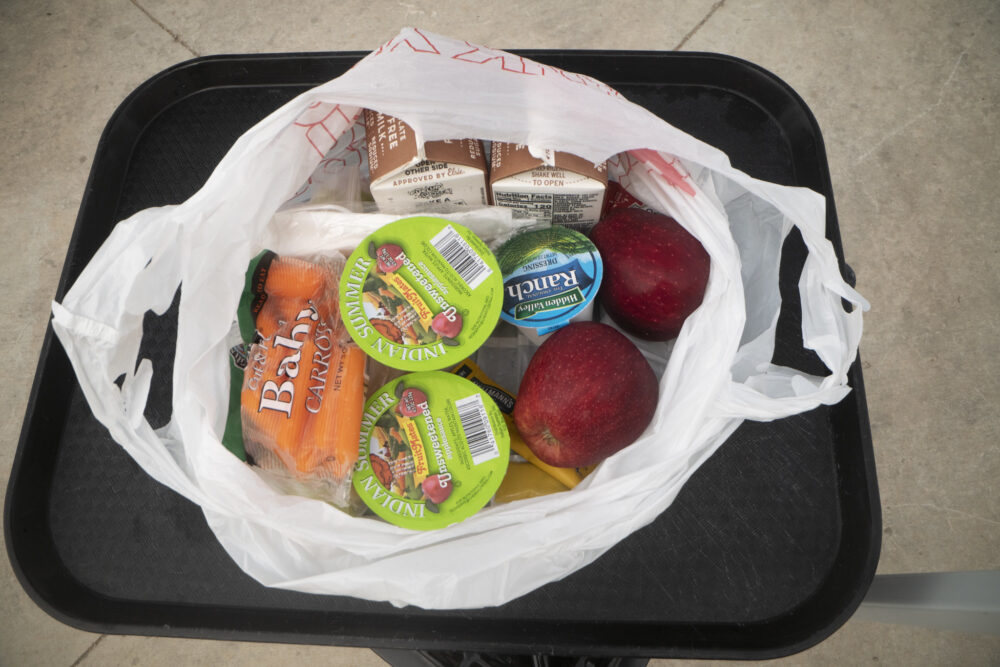
The U.S. Department of Agriculture has approved the Healthy Kids Iowa demonstration project in lieu of the federal government’s summer nutrition program for children, Gov. Kim Reynolds announced Wednesday.
A press release from the governor’s office called the program an alternative to the federal program that will feed children “healthier foods at a lower cost.”
According to the release, Healthy Kids Iowa will leverage partnerships with summer feeding programs and community providers that have more than 500 access points across the state.
In a video posted to her social media accounts, Reynolds said the program will allow eligible families to select $40 of “fresh, nutritious food” each month from the access points.
“We’re going to focus on easy to prepare meals for kids, without compromising nutrition,” Reynolds said in the video.
The distribution sites will offer a selection of foods each month that are “healthy and kid friendly” according to the press release.
Families with children aged 4 to 18 and with household income at or below 185% of the federal poverty level are eligible for the program. For a household of four, that represents an annual income of around $57,700 or lower.
Access points are determined by Feeding America Food Banks that will identify “areas of need” throughout Iowa. Families will apply for the program with The Emergency Food Assistance Program, or TEFAP, application.
Iowa is one of only 11 states not participating in the federal program, known as SUN Bucks, this summer, according to USDA. The state also opted out of the program in 2024, and instead chose to expand the number of summer meal sites in the state.
U.S. Secretary of Agriculture Brooke Rollins applauded Reynolds for what she called an “historic step.”
“We are encouraging governors across the entire country to explore creative ways to provide food for those in need while also doing right by the American tax payer,” Rollins said in a video statement.
According to Des Moines Area Religious Council, this $900,000 expansion in 2024 still left an estimated 54% of Iowa school districts without a meal site in 2024.
The SUN Bucks program is also called the Summer EBT, or electronic benefits transfer, program because funds are distributed on EBT cards monthly, allowing recipients to shop at eligible stores.
The SUN Bucks program provides $120 to families per eligible school-aged child during the summer. Children who qualify for free or reduced school lunches, or families who already participate in the Supplemental Nutrition Assistance Program, or SNAP, are eligible for SUN Bucks.
According to USDA in 2024 when the program launched, it represented a $100 million investment.
Reynolds has opposed the federal SUN Bucks program for fear that it would lead to unhealthy food purchases and worsen childhood obesity.
in August 2024, Iowa submitted a waiver request as part of an effort to implement a program similar to Healthy Kids Iowa, which the USDA denied.
Reynolds said in November she would try again for a waiver, hoping for an outcome in her favor under the Trump administration. Food security advocates then urged the governor to instead apply for the demonstration project in tandem with the federally available program.
Iowa Hunger Coalition, in a statement Wednesday, said it was concerned about the barriers Healthy Kids Iowa might place on families trying to access it, and on the “feeding organizations who are already experiencing record-breaking levels of need.”
“We continue to believe that the best way to serve Iowa’s low-income kids during the summer is through evidence-based USDA summer meal programs: summer meal sites, grab ‘n go sites, and Summer EBT, or SUN Bucks,” the statement read.
The coalition said the distribution of summer nutrition funds via EBT, per the SUN Bucks program, reaches families who live in rural communities or have working parents who might not be able to make it to a food pantry or feeding center during its operating hours.
“As further details are released about the Healthy Kids Iowa Pilot Program we hope these concerns are addressed to ensure that each and every child who qualifies is served and has their individual nutritional needs met by the program,” the statement read.
YOU MAKE OUR WORK POSSIBLE.
